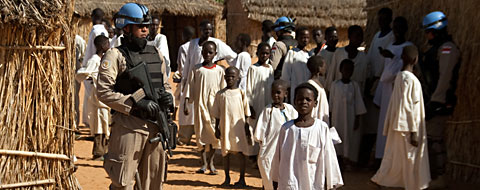Peace and security
Peacekeeping is one among a range of activities undertaken by the United Nations to maintain international peace and security throughout the world.

UN Photo/Olivier Chassot
A member of the Indonesian Formed Police Unit on patrol in Sudan.
The other activities are:
- conflict prevention and mediation
- peacemaking
- peace enforcement
- peacebuilding
Conflict prevention, peacemaking, peacekeeping and peace enforcement rarely occur in a linear or sequential way. Experience has shown that they should be seen as mutually reinforcing. If they are used piecemeal or in isolation, they fail to provide the comprehensive approach required to address the root causes of conflict and hence reduce the risk of conflict recurring.
Conflict prevention
Conflict prevention involves diplomatic measures to keep intra-state or inter-state tensions and disputes from escalating into violent conflict.
It includes early warning, information gathering and a careful analysis of the factors driving the conflict. Conflict prevention activities may include the use of the Secretary-General’s “good offices,” preventive deployment of UN missions or conflict mediation led by the Department of Political Affairs.
Peacemaking
Peacemaking generally includes measures to address conflicts in progress and usually involves diplomatic action to bring hostile parties to a negotiated agreement.
The UN Secretary-General may exercise his or her “good offices” to facilitate the resolution of the conflict. Peacemakers may also be envoys, governments, groups of states, regional organizations or the United Nations. Peacemaking efforts may also be undertaken by unofficial and non-governmental groups, or by a prominent personality working independently.
Peace enforcement
Peace enforcement involves the application of a range of coercive measures, including the use of military force. It requires the explicit authorization of the Security Council.
It is used to restore international peace and security in situations where the Security Council has decided to act in the face of a threat to the peace, breach of the peace or act of aggression. The Council may utilize, where appropriate, regional organizations and agencies for enforcement action under its authority and in accordance with the UN Charter.
Peacebuilding
Peacebuilding aims to reduce the risk of lapsing or relapsing into conflict by strengthening national capacities at all levels for conflict management, and to lay the foundation for sustainable peace and development. It is a complex, long-term process of creating the necessary conditions for sustainable peace. Peacebuilding measures address core issues that effect the functioning of society and the State, and seek to enhance the capacity of the State to effectively and legitimately carry out its core functions.
Role of peacekeeping
The boundaries between conflict prevention, peacemaking, peacekeeping, peacebuilding and peace enforcement have become increasingly blurred. Peace operations are rarely limited to one type of activity.
While UN peacekeeping operations are, in principle, deployed to support the implementation of a ceasefire or peace agreement, they are often required to play an active role in peacemaking efforts and may also be involved in early peacebuilding activities.
Today's multidimensional peacekeeping operations facilitate the political process, protect civilians, assist in the disarmament, demobilization and reintegration of former combatants; support the organization of elections, protect and promote human rights and assist in restoring the rule of law.
UN peacekeeping operations may use force to defend themselves, their mandate, and civilians, particularly in situations where the State is unable to provide security and maintain public order.